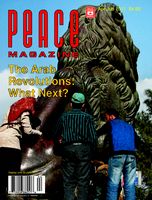
Peace Magazine Apr-Jun 2011, page 5. Some rights reserved.
Search for other articles by Fredrik Heffermehl here
I was delighted to read your review of The Nobel Peace Prize. Editor Metta Spencer makes perceptive and very interesting comments about the book and its intentions. She understands that the committee has made the elementary mistake of formulating its own prize for “peace”, ignoring a huge number of protests on behalf of Nobel who used the expression “champions of peace” to describe the recipients.
Unfortunately, Spencer has combined her review with an essay which is flawed at the outset (“First, apart from the legal questions about Nobelīs will…”). The will is a legal instrument; the content of the prize cannot be discussed as if the will did not exist.
And it should not. Nobel was so advanced that his will is far ahead of the times even 115 years later. The answer to Spencerīs question “how far should the concept of “peace work” be stretched to encompass other vital aspects of human security?” is easy. Peace work must be very broad and comprehensive and nobody should try to limit the scope of activity. This question is, however, irrelevant to the implementation of Nobelīs will.
Irrelevant, and very detrimental since, exactly as the Nobel committee does, the broad concept of peace is being used to deny the designated recipients, the champions of peace, of their legitimate right to receive the prize every year, not every now and then. Our ideas of peace have widened, yes—but Nobel was a visionary and his specific approach was to take the heart out of the war machinery. If the committee would respect the disarmament purpose of the will it would do something helpful to repair all the worst ills of the world, everywhere, every year. As long as we fail to demand strict compliance, Norwegian politicians will continue using the prize to promote their political ideas, loyal to NATO, the US and military strength, not to our ideas.
It is essential to see that the internationalist Nobel had the best of the world as a whole in mind and the prize makes a fundamental choice between two diametrically opposed directions in international affairs: either co-operation and trust (letting the power of the law replace the law of power) or distrust, power games and endless arms races. The Nobel Committee is obliged to honor the first road, help reawaken the concept of “general and complete disarmament” (NPT, Art VI) in international negotiations. It is a long time since the committee was seeking a basic change of the relations between nations and dared to challenge militarism as such.
If Nobelīs prize would be used as originally intended it would also do wonders to the peace movement. Not only in terms of a powerful financial incentive every year as well as attention to the cause of peace. It would also give direction and credibility to a very fragmented peace movement—too many of our efforts are not guided by an overall purpose, a goal, a vision of a world freed from the arms races and without national military forces. I doubt that we can succeed without directing our work and securing attention and respect for our views through a credible alternative vision of the world.
Like the Nobel committee Spencer makes the mistake of taking single expressions in the will out of their context and interpreting them literally, using her own ideas—instead of trying to understand what Nobel intended. When Nobel revised his will in 1895 choosing three expressions to describe the work of intended recipients, the “champions of peace,” he did so wishing to better cover “all the different aspects of the work of the peace movement of the 1890s” wrote the secretary of the Nobel Committee, Ragnvald Moe, in his book on the prize in 1932.
I am reluctant to go into the discussion of Liu Xiaobo as long as he is in jail, but as soon as he is out he should explain his ardent support for Western colonialism and US wars, past and present.1
I do not think the 2010 Nobel did much good to Liu and not to human rights and democracy in China. It increased international tension. If you wish to communicate ideas creating a friendly, good atmosphere, a belief in your honest motives is indispensible.
Furthermore, I am not so certain about the Nobel committeeīs motives. It is open to question whether in actual fact they were more eager to serve US foreign policy than to serve China. About one thing I am certain, along with numerous other authors: The committee does the world a great disservice by not serving Nobel.
Fredrik S. Heffermehl, lawyer, author of The Nobel Peace Prize: What Nobel Really Wanted (Praeger, 2010)
1 See Tariq Aliīs comment in the London Review of Books on http://www.lrb.co.uk/blog/2010/12/11/tariq-ali/the-nobel-war-prize and read the blog entries, in particular “Michael” on Dec. 15, 2010

Peace Magazine Apr-Jun 2011, page 5. Some rights reserved.
Search for other articles by Fredrik Heffermehl here